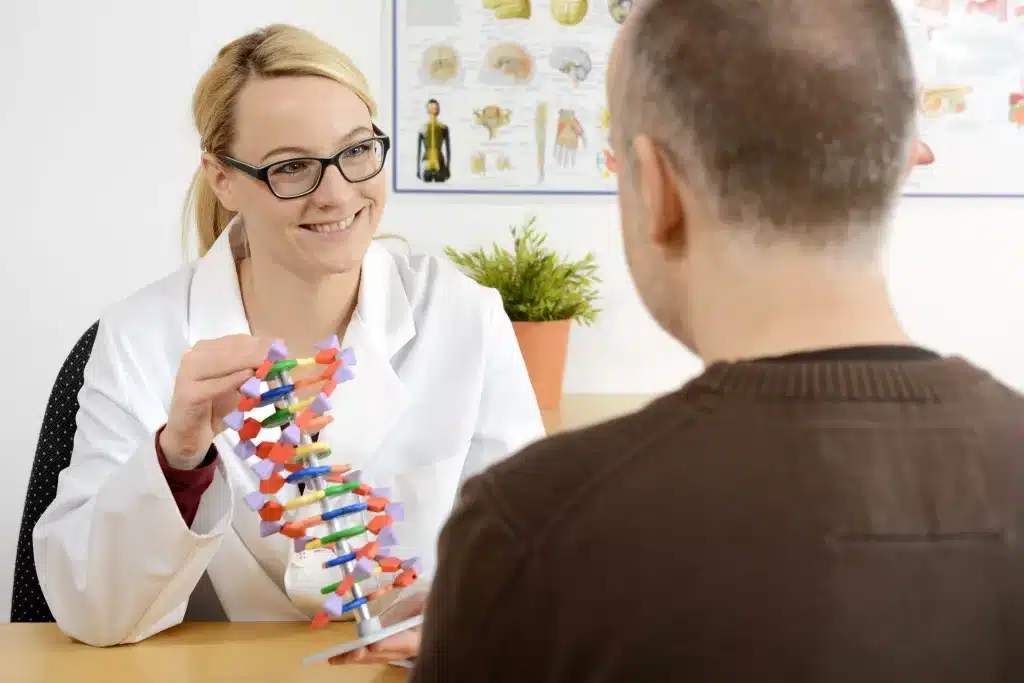Introduction
Genetic counseling and testing have become pivotal in the field of healthcare, offering invaluable insights into the genetic makeup of individuals and families. New technologies and discoveries continually reshape genetic counseling and testing in this rapidly evolving field. This blog aims to investigate the exciting emerging trends and advances revolutionizing genetic counseling and testing practices. By exploring cutting-edge techniques, innovative approaches, and the integration of genetics into healthcare, we want to make people aware of the revolutionary potential of these developments. Whether you’re a healthcare professional, a patient, or simply curious about the future of genetic counseling and testing, it will provide valuable insights into the latest developments and their impact on the field. Get ready to enter a captivating journey through the frontiers of genetic counseling and testing.
Overview of Genetic Counseling and Testing
Genetic counseling is a collaborative process between a trained genetic counselor and an individual or family. It aims to provide comprehensive information, support, and guidance regarding genetic conditions, inheritance patterns, and associated risks. Genetic counselors help individuals understand the implications of genetic information, make informed decisions about genetic testing, and navigate complex emotional and ethical considerations.
In healthcare, genetic counseling plays a vital role in various areas. It assists in diagnosing and managing genetic disorders, enabling individuals to understand the underlying causes, natural history, and available treatment options. Genetic counseling is particularly crucial in reproductive planning, helping couples assess their risk of passing on genetic conditions and explore options like prenatal testing, preimplantation genetic testing, or adoption. Additionally, genetic counselors contribute to cancer genetics, hereditary disease risk assessment, and precision medicine by interpreting genetic test results and providing personalized care recommendations.
Examples of Hereditary Genetic Counseling
1. Hereditary Cancer Syndrome
One of the areas where genetic counseling plays a crucial role is in the identification and management of hereditary cancer syndromes. Hereditary cancer syndromes are genetic conditions that predispose individuals to an increased risk of developing certain types of cancer. Gene mutations that are hereditary and can be handed down from one breed to the next are the root cause of these syndromes.
During a genetic counseling session for hereditary cancer syndrome, a genetic counselor will typically perform the following steps:
- Assessment of Personal and Family History: This information helps identify patterns of cancer occurrence and determine if there are indications of hereditary cancer syndrome.
- Genetic Testing Discussion: If hereditary cancer syndrome is suspected, the genetic counselor will explain the benefits, limitations, and implications of genetic testing.
- Informed Consent: This involves discussing the potential outcomes of testing, including the possibility of identifying a gene mutation, uncertain results, or negative results.
- Genetic Testing and Result Interpretation: After genetic testing is conducted, the genetic counselor will assist in interpreting the test results. They will explain the significance of identified gene mutations, their associated cancer risks, and the implications for the individual and their family members.
- Risk Assessment and Management: This may include increased surveillance through regular screenings, preventive measures such as prophylactic surgeries, chemoprevention options, and lifestyle modifications.
- Psychological Support and Counseling: The genetic counselor provides psychological support, addresses concerns and fears, and helps individuals and families navigate the emotional impact of the diagnosis.
- Family Communication and Cascade Testing: Genetic counselors emphasize the importance of sharing genetic information within the family. They guide how to effectively communicate the test results to other family members and encourage them to consider genetic testing and counseling.
Hereditary cancer syndrome genetic counseling sessions aim to empower individuals with knowledge about their genetic risks, assist in making informed decisions, and provide support throughout the process. The ultimate goal is to enable individuals and families to proactively manage their cancer risks, improve early detection, and potentially prevent or minimize the impact of hereditary cancer syndromes.
2. Expanded Carrier Screening
Expanded carrier screening is a valuable tool in genetic counseling that helps individuals and couples assess their risk of passing genetic conditions to their children. It involves testing individuals for various genetic disorders, regardless of their personal or family history, to identify potential carrier status for these conditions. Genetic counseling provides comprehensive information, support, and guidance throughout expanded carrier screening.
During a genetic counseling session for expanded carrier screening, a genetic counselor typically follows these key steps:
- Pre-Test Counseling: They will discuss the specific conditions in the screening panel, which can vary depending on the laboratory or testing platform used. The counselor will also provide information about the inheritance patterns, prevalence, and potential impact of the conditions being screened.
- Personal and Family History Assessment: The genetic counselor will gather detailed information about the individual’s personal and family medical history, focusing on any known genetic conditions or instances of specific disorders. This information helps customize the screening panel to target conditions most relevant to the individual or couple.
- Informed Consent: Before proceeding with expanded carrier screening, the genetic counselor will obtain informed consent. This involves discussing the screening’s benefits, limitations, and potential outcomes, including the possibility of identifying carrier status for specific genetic conditions and the potential implications for future family planning.
- Genetic Testing and Result Interpretation: Once the expanded carrier screening test is conducted, the genetic counselor will help interpret the results. They will explain the meaning of positive, negative, or inconclusive findings and discuss the likelihood of passing on specific genetic conditions to future children. The counselor will also provide information on the risks and potential reproductive options.
- Reproductive Planning and Decision-Making: The genetic counselor will facilitate discussions around reproductive planning and decision-making based on the test results. They will discuss the available options, such as preimplantation genetic testing (PGT), prenatal testing, adoption, or the possibility of using assisted reproductive technologies, depending on the identified carrier status and individual preferences.
- Emotional Support and Counseling: Expanded carrier screening may raise emotional and psychological concerns for individuals and couples. The genetic counselor provides support, addresses anxieties and fears, and helps individuals and couples navigate the emotional impact of the screening results. They also facilitate open communication between partners, fostering understanding and support during decision-making.
- Family Communication: Genetic counselors emphasize the importance of sharing carrier status information within the family. They guide how to effectively communicate the results and implications to other family members, encouraging them to consider carrier testing and counseling.
Expanded carrier screening genetic counseling sessions are tailored to each individual or couple’s needs and circumstances. The counselor aims to empower individuals with knowledge about their carrier status, assist in making informed decisions about family planning, and provide support throughout the process. The goal is to help individuals and couples understand their reproductive options and make choices that align with their values and goals.
3. GeneSight Psychotropic
It is an innovative example of hereditary genetic counseling that combines genetic testing with personalized medicine to optimize treating psychiatric conditions. This specialized genetic test analyzes an individual’s genetic variations to provide healthcare providers with insights into the most effective psychotropic medications and dosages for that individual. Genetic counseling is crucial in helping individuals and healthcare providers understand the implications of GeneSight Psychotropic testing and make informed decisions regarding psychiatric treatment.
During a genetic counseling session focused on GeneSight Psychotropic testing, a genetic counselor typically follows these key steps:
- Explanation of GeneSight Psychotropic Testing: The genetic counselor provides an overview of GeneSight Psychotropic testing, explaining its purpose, benefits, and limitations. They describe how the test analyzes genetic variations that affect how a person metabolizes and responds to specific psychiatric medications.
- Personal and Family History Assessment: The genetic counselor gathers a detailed personal and family medical history, focusing on psychiatric conditions, previous medication trials, and treatment responses. This information helps determine the appropriateness and relevance of GeneSight Psychotropic testing for the individual.
- Informed Consent: The genetic counselor obtains informed consent, explaining the specific genes and genetic variations analyzed by the test, the testing process, and the potential outcomes of the test results. They also discuss the importance of understanding that GeneSight Psychotropic testing is just one component of a comprehensive treatment plan.
- Genetic Testing and Result Interpretation: Once the genetic test is conducted, the genetic counselor assists in interpreting the results. They explain the significance of identified genetic variations and their association with medication metabolism and response. Based on the individual’s genetic profile, the counselor provides information on which medications may be more likely to be effective or have potential adverse reactions.
- Treatment Planning and Medication Selection: The genetic counselor collaborates with the individual’s healthcare provider to optimize treatment planning based on the test results. They discuss the potential benefits and limitations of specific psychotropic medications and provide recommendations on medication selection, dosing adjustments, and potential alternatives based on the individual’s genetic profile.
- Education and Counseling: The genetic counselor provides education about psychiatric conditions, medications, and the role of genetic variations in medication response. They address any questions or concerns the individual may have and ensure they clearly understand the test results and their implications for treatment.
- Ongoing Support and Follow-up: The genetic counselor offers ongoing support throughout treatment. They emphasize the importance of regular communication with the healthcare provider, monitoring treatment response, and addressing any changes in medication effectiveness or side effects.
GeneSight Psychotropic genetic counseling sessions aim to optimize psychiatric treatment outcomes by incorporating genetic information into personalized medicine. The genetic counselor collaborates with the individual and their healthcare provider to ensure informed decision-making, effective medication selection, and monitoring of treatment response.
Advances in Genetic Counseling Techniques
A. Preimplantation genetic testing (PGT) and its advancements
Preimplantation genetic testing (PGT) has revolutionized reproductive options for couples at risk of passing genetic conditions to their children. PGT involves the genetic analysis of embryos created through in vitro fertilization (IVF) before implantation. Recent advancements in PGT techniques include:
- PGT for Aneuploidies (PGT-A): PGT-A screens embryos for chromosomal abnormalities, such as aneuploidies (abnormal number of chromosomes). This helps improve IVF success rates by selecting chromosomally normal embryos for transfer.
- PGT for Monogenic Disorders (PGT-M): PGT-M allows the detection of specific genetic mutations or variants associated with monogenic disorders. It helps couples with known genetic conditions to select unaffected embryos for transfer, reducing the risk of passing on the condition.
- PGT for Structural Rearrangements (PGT-SR): PGT-SR is used for couples with structural chromosomal rearrangements, such as translocations or inversions. It enables the identification of embryos with balanced rearrangements, reducing the risk of unbalanced embryos and miscarriages.
B. Cascade testing and its role in identifying at-risk family members
Cascade testing involves systematically identifying at-risk family members for genetic testing and counseling after diagnosing a genetic condition in an index patient. This approach allows for identifying individuals who may be carriers or at risk of developing the same genetic condition. Cascade testing has several benefits:
- Early Diagnosis and Intervention: By identifying at-risk family members, cascade testing enables early diagnosis and intervention. It allows individuals to make informed decisions about their health, implement preventive measures, and access appropriate medical management.
- Family Planning: Cascade testing helps individuals understand their risk of passing the genetic condition to their children. It provides reproductive options, such as prenatal testing, preimplantation genetic testing, or adoption, allowing for family planning decisions based on accurate genetic information.
- Improved Disease Management: Cascade testing helps identify individuals already affected by a genetic condition that may have been undiagnosed. Early diagnosis allows for timely disease management, access to appropriate treatments, and improved patient outcomes.
C. Telemedicine and its impact on genetic counseling accessibility
Telemedicine has revolutionized healthcare delivery, including genetic counseling. It allows for remote consultations between genetic counselors and patients, overcoming geographical barriers and improving accessibility. The impact of telemedicine on genetic counseling includes:
- Increased Access to Genetic Counseling: Telemedicine expands access to genetic counseling services, particularly for individuals in remote or underserved areas. It allows patients to connect with genetic counselors without requiring extensive travel or long wait times.
- Convenience and Flexibility: Telemedicine provides convenience and flexibility for patients, as consultations can be conducted from their homes. This eliminates the need for travel and minimizes disruptions to work or other commitments.
- Cost-Effectiveness: Telemedicine can reduce healthcare costs associated with genetic counseling by eliminating travel expenses and reducing clinic overheads. This makes genetic counseling more affordable and accessible to more individuals.
- Privacy and Confidentiality: Telemedicine platforms ensure the privacy and confidentiality of genetic counseling sessions, maintaining the same ethical standards as in-person consultations. This helps alleviate concerns regarding the sharing of sensitive genetic information.
Emerging Trends in Genetic Counseling and Testing
A. Pharmacogenomics and personalized drug therapy
Pharmacogenomics is an emerging field focusing on how an individual’s genetic makeup influences their medication response. Genetic counselors are crucial in guiding patients and healthcare providers in utilizing pharmacogenomic information for personalized drug therapy. Key trends in this area include:
- Genetic Testing for Drug Response: Genetic testing can identify genetic variations that affect drug metabolism and response. By integrating this information into clinical decision-making, healthcare providers can optimize drug selection and dosage to maximize therapeutic benefits and minimize adverse effects.
- Clinical Decision Support Tools: Genetic counselors increasingly utilize clinical decision support tools that leverage pharmacogenomic data to provide personalized medication recommendations. These tools analyze genetic information alongside drug databases to guide treatment choices based on an individual’s genetic profile.
- Patient Education and Empowerment: Genetic counselors play a vital role in educating patients about pharmacogenomics, its potential benefits, and its limitations. They help patients understand how their genetic information can inform personalized drug therapy decisions, empowering them to participate in their treatment plans actively.
B. Direct-to-consumer genetic testing and its implications
Direct-to-consumer (DTC) genetic testing has gained popularity, allowing individuals to access their genetic information without the involvement of healthcare providers. Genetic counselors are adapting to this trend and addressing its implications, which include:
- Interpretation and Communication of Results: Genetic counselors assist individuals in interpreting complex DTC genetic testing results and understanding the associated risks and limitations. They ensure accurate and meaningful information communication to facilitate informed decision-making and reduce anxiety or misinterpretation.
- Privacy and Data Security: DTC genetic testing raises concerns about the privacy and security of personal genetic information. Genetic counselors can help individuals navigate these concerns by discussing data protection measures and providing guidance on selecting reputable testing companies.
- Integration with Clinical Care: DTC genetic testing results may impact an individual’s healthcare decisions and management. Genetic counselors collaborate with healthcare providers to integrate DTC test results into the clinical context, ensuring appropriate, evidence-based follow-up care.
C. Genetic counseling for rare diseases and gene therapies
Genetic counseling is playing an increasingly important role in the field of rare diseases and gene therapies. Emerging trends in this area include:
- Precision Diagnosis: Genetic counselors aid in the precise diagnosis of rare genetic disorders by utilizing advanced genetic testing technologies and expertise in variant interpretation. Accurate diagnosis facilitates appropriate management and access to targeted therapies or clinical trials.
- Therapeutic Decision-Making: Genetic counselors support individuals and families considering gene therapies for rare genetic disorders. They discuss these novel treatments’ potential benefits, risks, and ethical considerations, empowering patients to make informed decisions.
- Long-term Follow-up and Monitoring: Genetic counselors collaborate with healthcare teams to ensure long-term follow-up and monitoring of individuals undergoing gene therapies. They provide ongoing counseling and support, addressing emerging challenges or concerns related to treatment outcomes or potential side effects.
Conclusion
For individuals seeking genetic counseling and testing services, staying updated ensures access to the most accurate and up-to-date information. It allows individuals to make informed decisions about their health, understand the implications of their genetic information, and benefit from the latest advancements in personalized medicine.
New U Women’s Clinic & Aesthetics recognizes the importance of staying updated in genetic counseling and testing. Our clinic is committed to providing cutting-edge genetic counseling services encompassing emerging trends and advances.
New U Women’s Clinic & Aesthetics is dedicated to providing exceptional genetic counseling and testing services that reflect the latest developments in the field, ensuring the best possible care for our patients.










